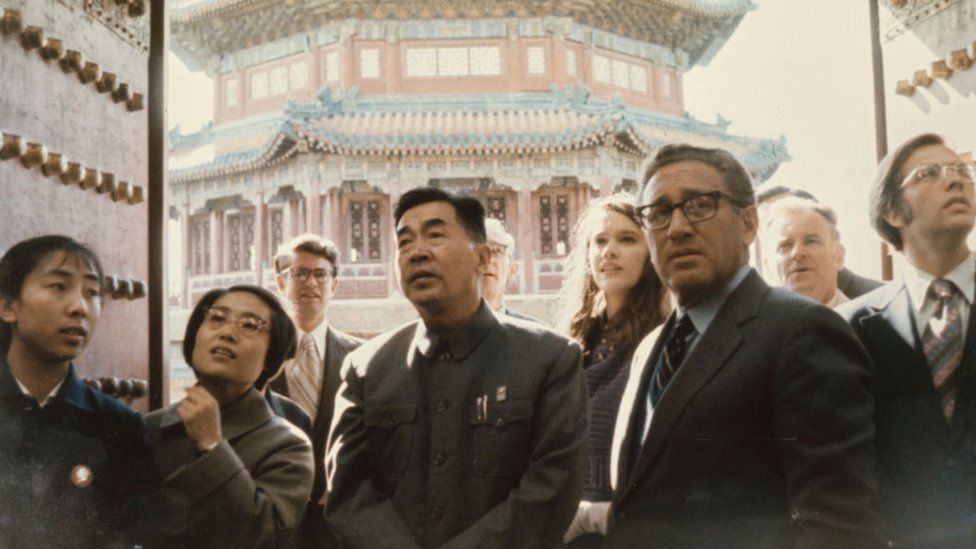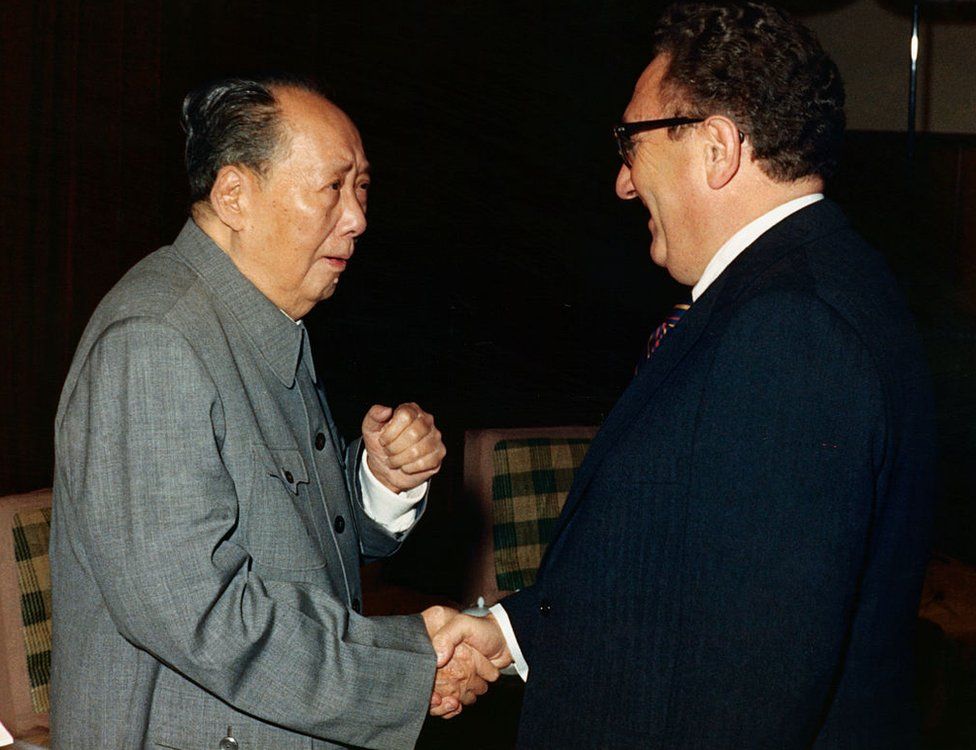The death of contentious former US Secretary of State Henry Kissinger has drawn nostalgia and compliments in China at a time when relations between the two countries have nosedived.
“You are forever a friend of Chinese people, rest in peace,” a top-liked comment on the country’s social media platform Weibo reads.
Hours after news of the death broke, the related hashtag became the most searched trend in China, with millions of views.
“This is the end of an era,” a top-liked comment says. “He witnessed decades of ups and downs. What would he think about current China-US relations?” another user asked.
Relations between Washington and Beijing have perhaps hit their lowest point since the two sides began talking officially in 1979 – a culmination of efforts kicked off by Mr Kissinger. While ties were “normalised” under President Jimmy Carter, it was his predecessor Richard Nixon who made that first historic trip to Beijing to meet Mao Zedong in 1972, putting an end to decades of hostility.
Mr Kissinger, who shaped US foreign policy during some of the most crucial Cold War years, was instrumental in brokering that trip, which many see as a pivotal moment in China’s decision to engage with the West. In 1971, he paid a clandestine visit to Beijing to arrange the meeting.
Largely respectful and solemn, the comments on Chinese social media portray Mr Kissinger as an old and trusted friend from a time when the US and China had eagerly embraced each other.
It was also a time when America was trying to talk to the Soviet Union, and hoped better relations with China would increase the pressure. The Vietnam war was still raging – Mr Kissinger has both been lauded for crafting a peace deal, and also denounced for not ending the war earlier. And he was called a war criminal for his role in the bombing of Laos and Cambodia, which killed tens of thousands of civilians.
Disliked in Vietnam, Laos and Cambodia, he was nevertheless lionised in China for his role in launching what was the honeymoon period in US-China relations.
Mr Kissinger was one of the most well-known Americans among Chinese people. To this day, his name is taught in history lessons across the country, and so many see him as a friendly Western face – something that they believe has become increasingly rare.

Throughout his decades-long career, Mr Kissinger saw engagement with China as one of his main legacies.
“China is the country with which I have the longest and most in-depth contact. China has become a very important part of my life,” he said in a 2011 interview with Chinese state media Can Kao Xiaoxi.
He was one of very few foreign leaders who met five generations of Communist leaders, from Mao to Xi Jinping. In a post on Weibo, state broadcaster CCTV called him a “living fossil” who witnessed the evolution of the countries’ bilateral relationship.
His support for engagement between the two countries was so strong that he called the brutal crackdown on the 1989 Tiananmen student protests “inevitable”.
“Its brutality was shocking,” he wrote in the Washington Post in August 1989, but he also said “No government in the world would have tolerated having the main square of its capital occupied for eight weeks by tens of thousands of demonstrators.”
He had written then that “China remains too important for America’s national security to risk the relationship.”
In recent years too, Mr Kissinger called for easing tensions between the US and China. He pushed for it even as China grew to become the world’s second-largest economy and challenged the very American power Mr Kissinger had wielded for much of his life.
And he was always welcome in Beijing – both a reminder of the era of US engagement and a consistent advocate of it.

He visited China more than 100 times, long after he retired – the last visit was this July, where the 99-year-old former diplomat was welcomed by Mr Xi in Beijing despite the chill in relations between China and the US.
Mr Xi said to him China would never forget “our old friends” and China’s top diplomat Wang Yi said that the US needed “Kissinger-style diplomatic wisdom” in its China policy.
The meeting took place just weeks after US Secretary of State Antony Blinken’s high-stakes visit to China to rekindle contacts, and irked the White House. Mr Kissinger appeared to have better access in Beijing than current US government officials.
“China and the US must inherit and carry forward Dr Kissinger’s strategic vision, political courage and diplomatic wisdom,” foreign ministry spokesman Wang Wenbin said on Thursday after hailing Mr Kissinger as an “old and good friend of the Chinese people”.
The Chinese Communist Party has been unabashed in its compliments to Mr Kissinger – a stark contrast to the reactions America usually draws.
“History will remember what the centenarian had contributed to China-US relations,” Chinese ambassador to the US Xie Feng said.
State media outlet China News Service described him as someone who had “a sharp vision and could see through the world’s affairs”.
The view just across the strait – in Taiwan, where fear of Beijing’s threats has grown – is less kind.
When the US normalised relations with China in 1979, it switched diplomatic recognition from the self-governed island of Taiwan, agreeing that there was only one China, whose government sat in Beijing.
“From a historical perspective, he is a negative figure,” wrote one user on Facebook.
Another top comment reads: “He made Taiwan suffer too much.”
Source : BBC
















Add Comment